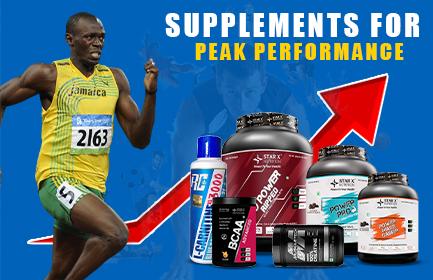As the quest for enhanced athletic performance intensifies, many athletes turn to dietary supplements hoping for a competitive edge. But how effective-and safe-are these products really? Researchers at the University of California, Davis Health have conducted an in-depth analysis to separate fact from fiction in the world of sports supplements. This article explores their findings, shedding light on which supplements may offer real benefits, which could pose risks, and whether you should consider incorporating them into your training regimen.
Understanding the Role of Supplements in Athletic Performance
Athletic performance can be influenced by a myriad of factors, and supplements have become a popular consideration among athletes striving to gain an edge. However, it’s critical to recognize that not all supplements deliver on their promises, and many lack rigorous scientific backing. Effective supplementation hinges on the specific needs of the athlete, the sport involved, and evidence-based research supporting its use. For instance, supplements like creatine and beta-alanine have shown consistent performance benefits in certain types of high-intensity training, while others may offer marginal gains or pose health risks if misused.
Before integrating supplements into a training regimen, athletes should weigh the potential benefits against risks such as contamination, adverse effects, or interactions with medications. Below is a quick overview of common supplement categories and their general standing based on current evidence:
| Supplement | Performance Benefit | Risk Level |
|---|---|---|
| Creatine | Improves power output and recovery | Low |
| Caffeine | Enhances alertness and endurance | Moderate (depends on dosage) |
| BCAAs | May reduce muscle soreness | Low |
| Anabolic Steroids | Increases muscle mass dramatically | High (illegal and unsafe) |
Ultimately, the decision to use supplements should be made with a comprehensive understanding of their effects, legal status, and the athlete’s personal health profile. Consulting with healthcare professionals, such as sports nutritionists or physicians, is advisable to tailor supplementation strategies safely and effectively.
Evaluating the Scientific Evidence Behind Popular Supplements
In recent years, the supplement industry has exploded with a variety of products claiming to enhance athletic performance, build muscle, or accelerate recovery. However, when closely examined, the scientific backing behind many popular supplements often falls short of strong, conclusive evidence. Research consistently supports the effectiveness of only a select few supplements such as creatine, caffeine, and beta-alanine, which have demonstrated measurable benefits in controlled studies. Conversely, many supplements, including those marketed for boosting endurance or eliminating fatigue, lack rigorous clinical trials or present conflicting results, leaving athletes to navigate a confusing landscape.
Below is a concise summary illustrating common supplements and their evidence-based efficacy:
| Supplement | Scientific Support | Typical Use |
|---|---|---|
| Creatine | Strong | Muscle power & recovery |
| Caffeine | Strong | Increased alertness & endurance |
| Beta-Alanine | Moderate | Delay muscle fatigue |
| Omega-3 Fatty Acids | Limited | Inflammation reduction |
| Branched-Chain Amino Acids (BCAAs) | Weak | Muscle soreness prevention |
Athletes should systematically weigh the scientific credibility against marketing hype. Key factors to consider include:
- Dosage and timing: Supplements often require precise intake to be effective;
- Individual variability: Genetics and training status influence outcomes;
- Potential interactions: Some supplements may interfere with medications or overall nutrition.
By critically evaluating these aspects, athletes can make informed decisions that prioritize health and performance over costly gimmicks.
Potential Risks and Safety Concerns for Athletes
While supplements promise enhanced performance and expedited recovery, their use is not without significant drawbacks. Athletes may unknowingly expose themselves to substances banned by sports organizations, risking disqualification or sanctions. Furthermore, many products contain unregulated ingredients, leading to potential contamination or inclusion of harmful compounds. The lack of stringent oversight means dosage inaccuracies can cause adverse effects ranging from mild gastrointestinal issues to severe cardiovascular problems.
Common safety concerns include:
- Mislabeling or undisclosed stimulants
- Interactions with prescribed medications
- Overconsumption leading to nutrient imbalances
- Long-term organ stress, particularly on liver and kidneys
| Risk | Potential Impact | Prevention Tip |
|---|---|---|
| Ingredient Contamination | Positive doping test | Use third-party tested brands |
| Excessive Dosage | Organ damage | Follow recommended guidelines |
| Interactions | Reduced medication efficacy | Consult healthcare professionals |
Guidelines from UC Davis Health on When and How to Use Supplements Effectively
UC Davis Health emphasizes that supplements should never replace a balanced diet but can serve as strategic tools for athletes aiming to optimize performance and recovery. Their guidelines recommend consulting with healthcare professionals to tailor supplement use based on individual nutritional needs, sport-specific demands, and existing medical conditions. Athletes are encouraged to focus on evidence-backed supplements such as vitamin D, iron, and omega-3 fatty acids, which play critical roles in muscle function, inflammation control, and endurance.
To ensure effectiveness and safety, UC Davis Health advises paying close attention to dosage, timing, and potential interactions. Below is a simplified overview of recommended supplement timing:
| Supplement Type | Best Time to Take | Purpose |
|---|---|---|
| Protein | Within 30 mins post-workout | Muscle repair & growth |
| Iron | Morning with vitamin C | Enhances oxygen transport |
| Omega-3 | With meals | Reduces inflammation |
| Vitamin D | Morning or afternoon | Bone health & immunity |
- Always choose supplements certified by third-party testing to avoid contamination and banned substances.
- Be cautious with “megadoses” as exceeding recommended amounts can be harmful.
- Track how supplements affect performance and health to make informed adjustments.
The Conclusion
In conclusion, while supplements can offer certain benefits to athletes, the University of California – Davis Health emphasizes caution and informed decision-making. Not all products on the market are backed by solid scientific evidence, and some may even pose health risks or violate sports regulations. Ultimately, athletes should prioritize a balanced diet, proper training, and consult healthcare professionals before incorporating supplements into their regimen. As research continues to evolve, staying informed remains key to making choices that support both performance and long-term well-being.





